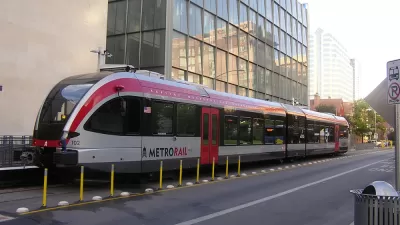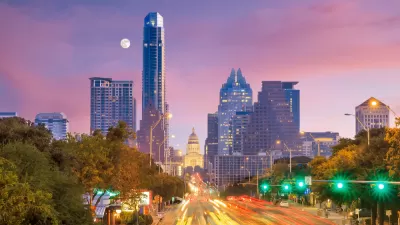A light rail bridge proposed for Lady Bird Lake, still pre-design, is causing controversies about whether adding buses to the bridge would be too dangerous for the other non-automotive modes.
Nathan Bernier reports for KUT about a key question among many in Austin's $7 billion Project Connect public transit expansion plan: Should Capital Metro buses be allowed to cross a light rail bridge planned to cross Lady Bird Lake?
"The question has been a hot topic among close observers of the process and recently emerged at a public design workshop hosted by the Austin Transit Partnership (ATP), the government corporation created to oversee the $7 billion Project Connect transit expansion," writes Bernier. The debate also spilled over to a contentious meeting of the Urban Transportation Commission (UTC), according to Bernier.
UTC Commissioner Samuel Franco is quoted in the article saying that blocking buses from the bridge would perpetuate the racist history of planning Austin (Austin's 1928 Master Plan forced Black residents to the city's East Side, as noted by Bernier in the article).
ATP staffers have claimed that buses would create conflicts on a bridge designed to accommodate pedestrians, cyclists, and light rail. "In particular, [Peter Mullan, ATP chief of architecture and urban design] said, he wasn't sure how buses could be incorporated in an underground tunnel on the north side of the lake because it's so constrained," reports Bernier.
The decision about whether to include buses on the bridge will have to wait for a competitive bid process for the bridge design. "The ATP is planning to issue a request in January for engineering firms worldwide to compete for the contract to design the bridge," according to Bernier.
FULL STORY: Should buses be allowed on a new light-rail bridge over Lady Bird Lake?

Planetizen Federal Action Tracker
A weekly monitor of how Trump’s orders and actions are impacting planners and planning in America.

Map: Where Senate Republicans Want to Sell Your Public Lands
For public land advocates, the Senate Republicans’ proposal to sell millions of acres of public land in the West is “the biggest fight of their careers.”

Restaurant Patios Were a Pandemic Win — Why Were They so Hard to Keep?
Social distancing requirements and changes in travel patterns prompted cities to pilot new uses for street and sidewalk space. Then it got complicated.

Platform Pilsner: Vancouver Transit Agency Releases... a Beer?
TransLink will receive a portion of every sale of the four-pack.

Toronto Weighs Cheaper Transit, Parking Hikes for Major Events
Special event rates would take effect during large festivals, sports games and concerts to ‘discourage driving, manage congestion and free up space for transit.”

Berlin to Consider Car-Free Zone Larger Than Manhattan
The area bound by the 22-mile Ringbahn would still allow 12 uses of a private automobile per year per person, and several other exemptions.
Urban Design for Planners 1: Software Tools
This six-course series explores essential urban design concepts using open source software and equips planners with the tools they need to participate fully in the urban design process.
Planning for Universal Design
Learn the tools for implementing Universal Design in planning regulations.
Heyer Gruel & Associates PA
JM Goldson LLC
Custer County Colorado
City of Camden Redevelopment Agency
City of Astoria
Transportation Research & Education Center (TREC) at Portland State University
Camden Redevelopment Agency
City of Claremont
Municipality of Princeton (NJ)





























